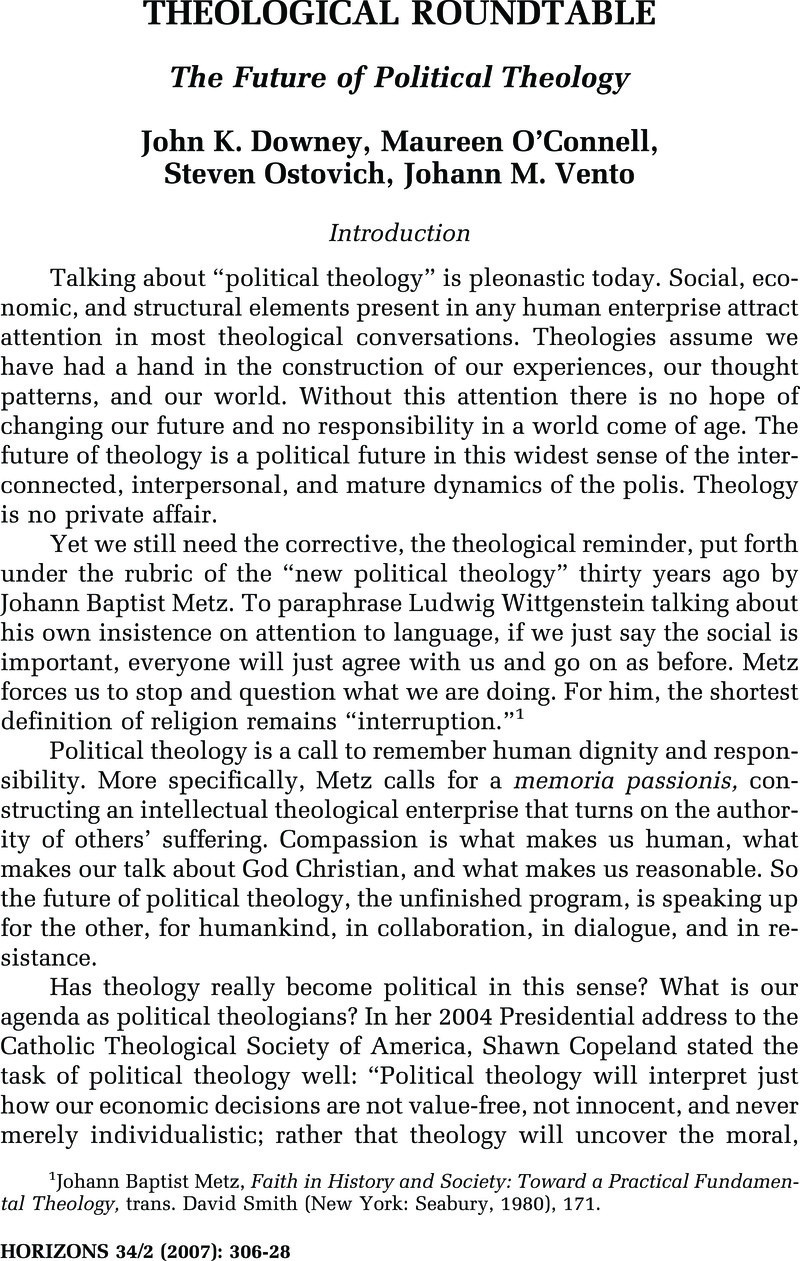No CrossRef data available.
Article contents
The Future of Political Theology - II. Faith from the Long Shadows of Guilt: Toward Political Theology in the United States
Published online by Cambridge University Press: 18 March 2013
Abstract

- Type
- Theological Roundtable
- Information
- Copyright
- Copyright © The College Theology Society 2007
References
10 Copeland, , “Political Theology as Interruptive,” 72.Google Scholar
11 A selection of paradigmatic and recent works in public theology includes the following: Murray, John Courtney, We Hold These Truths: Catholic Reflections on the American Proposition (New York: Sheed & Ward, 1960)Google Scholar; Tracy, David, The Analogical Imagination (New York: Crossroad, 1981)Google Scholar; Himes, Kenneth and Himes, Michael, Fullness of Faith: The Public Significance of Theology (New York: Paulist, 1993)Google Scholar; Marty, Martin E. and Moore, Jonathan, Politics, Religion, and the Common Good (San Francisco: Jossey-Bass, 2000)Google Scholar; and Doak, Mary, Reclaiming Narrative for Public Theology (Albany: SUNY Press, 2004).Google Scholar
12 Copeland also maps out a North American Political Theology in Memory, Emancipation and Hope: Political Theology in the Land of the Free (Santa Clara, CA: Santa Clara University Press, 1997)Google Scholar and explores the dangerous memories of the African slave experience in “Knowing Christ Crucified: Dark Wisdom from the Slaves,” in Missing God?, 59–78. Mary Doak creatively draws upon political theology in articulating the role of narrative in contemporary public theology in Reclaiming Narrative for Public Theology. A recent collection of essays edited by Cassidy, Laurie and Mikulich, Alexander, Interrupting White Privilege: Catholic Theologians Break the Silence (New York: Orbis, 2007)Google Scholar embodies the critical and transformative nature of political theology in the specific context of racism and privilege.
13 In doing so, I rely on Metz's Faith in History and Society. In terms of theological assessment of this context, I also find the first two chapters of Tilley's, TerranceReligious Diversity and the American Experience (New York: Continuum, 2007), 1–46Google Scholar, helpful in mapping out both what he sees as the distinctive characteristics of the American “site” for theology. From the perspective of sociology of religion, I find Marty's, MartinPolitics, Religion, and the Common Good as well as Strong Religion: The Rise of Fundamentalisms around the World, ed. Almond, Gabriel, Appleby, Scott, and Sivan, Emmanuel (Chicago: University of Chicago Press, 2003)Google Scholar insightful. Finally, from the perspective of political science, see Wald's, KennethReligion and Politics in the United States (New York: Roman & Littlefield, 2003).Google Scholar
14 Moltmann, Jiirgen, God for a Secular Society: The Public Relevance of Theology, trans. Kaiser, Christian (Minneapolis: Fortress Press, 1999), 49.Google Scholar
15 For a full description see chapter 10 in Metz's Faith in History and Society.
16 Copeland, , Memory, Emancipation and Hope, 6.Google Scholar
17 For comprehensive theological reflection on the phenomenon of globalization see Globalization and Catholic Social Thought: Present Crisis, Future Hope, ed. Coleman, John A. and Ryan, William F. (Ottawa: Novalis Press, 2005)Google Scholar; Peter, Rebecca Todd, In Search of the Good Life: The Ethics of Globalization (New York: Continuum, 2006)Google Scholar; Grody, Daniel and Phan, Peter, Globalization, Spirituality and Justice (New York: Orbis, 2007).Google Scholar
18 Berger's, Peter chapter entitled “The Desacralization of the World: A Global Overview” in Desacralization of the World: Resurgent Religion and World Politics, ed. Berger, Peter et al. (Washington, DC: Ethics and Public Policy Center/Grand Rapids, MI: Eerdmans, 1999), 1–18Google Scholar is a helpful resource on this topic.
19 Metz, , “Under the Spell of Cultural Amnesia?,” Missing God, 8.Google Scholar
20 See Kiester, Lisa, “Upward Mobility: Exploring the Roman Catholic Advantage,” Social Forces 85/3 (March 2007), 1195–1225.CrossRefGoogle Scholar
21 For an ethical analysis of the causes of and responses to Hurricane Katrina see There is No Such Thing as Natural Disaster: Race, Class and Katrina, ed. Hartman, Chester (New York: Routledge, 2006)Google Scholar and Dyson, Michael Eric, Come Hell or High Water: Hurricane Katrina and The Color of Disaster (New York: Basic Books, 2006).Google Scholar
22 Copeland, , Memory, Emancipation and Hope, 6.Google Scholar
23 Soelle, , Suffering, 36.Google Scholar
24 Bellah, Robert et al. , Habits of the Heart: Individualism and Commitment in American Life, rev. ed. (Berkeley: University of California Press, 1996).Google Scholar
25 Chowers, Eyal, The Modern Self in the Labyrinth (Cambridge, MA: Harvard University Press, 2004).Google Scholar Chowers suggests that our capacity for rational progress has increasingly alienated us from ourselves and one another. This leads to a realism rooted in “anonymous domination” by complex institutions and structures. It fosters within the American psyche a highly individualized coping mentality evidenced by the American obsession with work, therapy, consumerism and aesthetic self-recreation.
26 For an evaluative philosophical overview of American compassion see Olasky, Marvin, The Tragedy of American Compassion (1992; repr., Wheaton, IL: Crossway Books, 1995)Google Scholar; Nussbaum, Martha, Cultivating Humanity: A Classical Defense of Reform in Liberal Education (Cambridge, MA: Harvard University Press, 1997)Google Scholar; idem, “Compassion and Terror,” Daedalus 132 (Winter 2003): 10–26. See also Hille Haker's articulation of political compassion in “Compassion as a Global Programme for Christianity,” in In Search of Universal Values, ed. Kuschel, Karl-Josef and Mieth, Dietmar, Concilium 2001/4 (London: SCM-Canterbury Press, 2001), 55–70.Google Scholar




